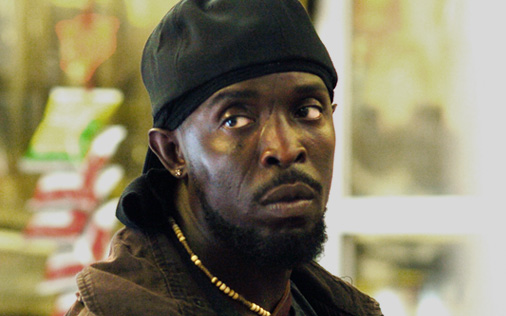The Wire is a failure. It was an expensive show to produce, received shockingly low ratings and was renewed for all of its planned five seasons only by the skin of its teeth. Series five (out on DVD box set this week), averaged under one million viewers per show in the States; here, on FX, that series opener got just 38,000. It never won an Emmy and was nominated only twice, for its writing.
A flop, then, in traditional terms. But this sprawling, idiosyncratic cop show has an extraordinary afterlife. It gathers adoration in massive DVD sales and internet viewings, legal or otherwise. It’s discussed and dissected by broadsheets turned into the sort of superfans normally relegated to fan sites and forums. Barack Obama named the show his favourite; given The Wire‘s brutal depiction of politics and corruption, it was an alarmingly candid confession. It’s a cultural phenomenon: The Greatest TV Show Of All Time. If you’ve seen it, you know why.
The Wire credits its viewers with intelligence. It’s a simple enough idea, but after watching the show, you realise how rare it is that you’re made to work for your entertainment. The storytelling here is so against the grain that it takes time to get used to it, time to settle in. Though it seems like a cop show at first, after five series, you are given the whole city – law and order, of course, but also schools, the media, politics and the dockers (creator David Simon calls this season, the second, "an elegy for the working class"). Many things are called epic but few deserve the label like The Wire. Every single storyline, even the seemingly peripheral, earns its place. Characters and plots appear after being dormant for two or three series, sometimes just as an offhand reference, sometimes as part of this enormous, intricate web. Episodes are slow but so detailed that if you miss one conversation, it all starts to unravel. The structure is remarkable. They’ve ripped up the conventions of screenwriting. The hero does not conquer all after a series of predictable pitfalls. Nobody wins. Main characters are killed not only mid-series, but mid-episode. By refusing to play by the rules of television drama, the creators have invigorated it. Its originality is often breathtaking.
Much is made of the thick Baltimore accent but it’s the slang which really makes you work. By necessity you learn the vernacular of the drug dealers, the code of the cops, the convoluted doublespeak of politicians, the language of the newsdesks… All different, all presented without explanation or clarification. There are no "name" actors. There are Brits playing Americans (it’s devastating to learn that McNulty is really an old Etonian, just as it’s strange to think of Omar as a backing dancer for Madonna). Theatre veterans play gangsters. Gangsters play gangsters – Snoop, sporting the thickest accent of all and sharing a name with her character, served time for murder. It’s praised for its authenticity, and while The Wire is authentic, undoubtedly, it is also a drama. Etonian or gangster, dramatic quality is all.
But the big question is whether it is just a TV show. David Simon wrote a piece for the Guardian’s Weekend magazine recently, angry that "our little drama" is what it takes to get people to discuss "what has gone wrong in urban America". Series five implies that it should be the job of the newspapers, but they are not up to the task. As a television show, a weekly, hour-long slice of entertainment, The Wire shouldn’t have to act as a voice of dissent or a focal point for discussions about crime, black communities, poor communities, police impotence and political apathy. But it does. You get the impression that David Simon can’t help but care. Art – it might be pompous to call it art, but Simon admits he’s influenced by Balzac, Camus and Chomsky, and the show welcomes literary comparisons – has always had the power to call for change. Television should not eschew this responsibility. It’s a tragedy that The Wire is relatively distinct for taking it on.
Will it change things? David Simon and his writers have given a voice to people usually denied one, particularly in entertainment, and is asking the kind of questions that are not being asked. But it’s still a TV show, and its slow-burning triumph might be to its detriment. It is not talked about like American Idol is talked about, bloated with ratings and instant success. The wave is long and low, but if Obama says it’s his favourite show, maybe the right kind of people are watching it, after all. It might prove to commissioners and advertisers that people are capably of taking in more, of doing the work themselves, of thinking about what is hidden, of being entertained by a television show which is bleak and cynical and unpleasant and angry. But again, its success was one of with time and patience. And perhaps time and patience with TV drama will be one of The Wire‘s inevitable aftershocks. "Why y’all playing chequers on a chess board?" D’Angelo asks, early in the first season. David Simon seems to be asking producers that same question.



